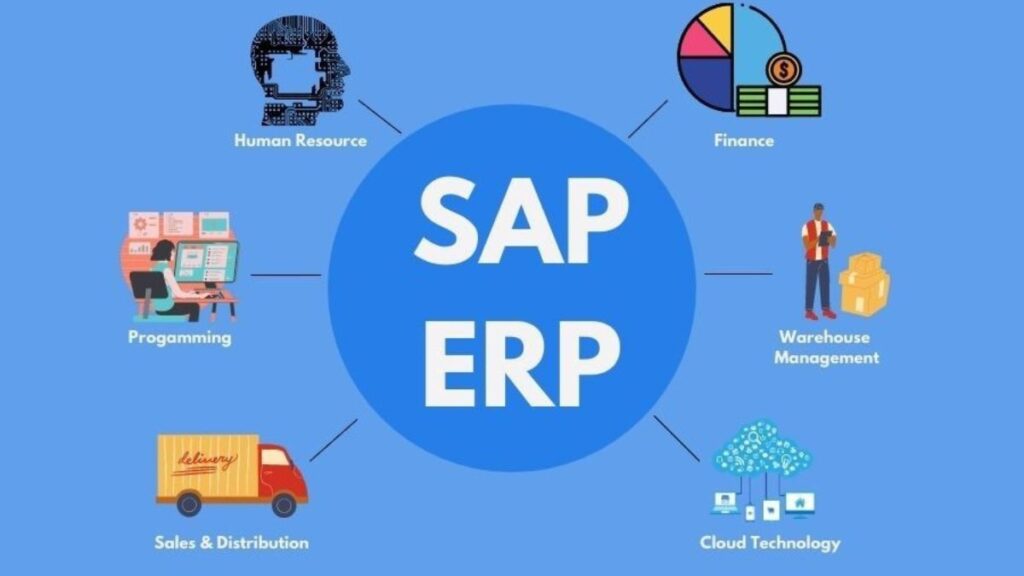Key Takeaways
- Discover emerging trends and innovations in SAP ERP.
- Understand how these technologies can optimize business processes.
- Gain insights into real-world applications and benefits of modern ERP systems.
Introduction
SAP ERP systems have long been the backbone of many enterprises, streamlining operations and optimizing resources. These systems have evolved to meet modern businesses’ growing demands and complexities. As technology continues to grow, so does the landscape of SAP ERP solutions. This article looks at the newest developments and patterns influencing SAP ERP in the future. It offers advice on how companies can use these improvements to become more competitive and efficient.
Artificial intelligence (AI), machine learning, and cloud computing are new ways businesses can improve operations. Understanding the potential of contemporary ERP solutions is essential since organizations are looking for ways to use these technologies to stay ahead in a cutthroat market.
Emerging Technologies in SAP ERP
Recent technological advancements are transforming SAP ERP systems. Machine learning, artificial intelligence (AI), and cloud computing are at the forefront of these innovations. Integrating AI-driven analytics can improve decision-making processes by offering real-time insights and predictive analytics, for instance. This enables companies to predict market trends and make data-driven decisions more accurately.
Additionally, cloud-based ERP solutions offer greater flexibility and scalability, allowing businesses to adapt quickly to changing market demands. Accessing ERP systems from anywhere, anytime, ensures that companies can maintain continuity and efficiency, even during unforeseen disruptions. This has proven especially beneficial after the COVID-19 pandemic, where remote work has become the norm for many organizations.
Finding patterns and abnormalities in massive datasets is one-way machine learning algorithms can further optimize business operations. This may result in better customer service, more effective inventory management, and successful financial planning. As these technologies continue to develop, their integration into SAP ERP systems will provide even more excellent opportunities for innovation and growth.
Streamlined Business Processes
Adopting new ERP technologies enables businesses to streamline their processes more effectively. Automation tools, for instance, can handle routine tasks, reducing the burden on employees and minimizing human error. As a result of the increased efficiency, staff members can concentrate on more strategic tasks like business development and innovation.
One of automation’s main advantages is its ability to standardize procedures across various departments. This ensures consistency and accuracy, particularly important for large organizations with complex operations. Furthermore, automated systems can provide real-time updates and notifications, enabling quicker response times and more informed decision-making.
A Gartner report highlights that companies implementing cloud-based ERP systems often see significant improvements in their operational processes, boosting overall productivity. Operations may become more effective and efficient if different business functions, including supply chain management, finance, and HR, can be combined into a cohesive system.
Moreover, integrating predictive analytics within ERP systems allows businesses to forecast demand, manage risks, and optimize resources more effectively. This level of foresight can be a game-changer for companies looking to stay ahead of their competitors. In addition, cloud-based ERP solutions offer scalability, enabling businesses to expand their capabilities as they grow without significant infrastructure investments. This flexibility is crucial in today’s dynamic business environment, where organizations must adapt quickly to market demands and customer expectations. By leveraging automation alongside advanced features like predictive analytics and machine learning, businesses can transform their operations, making them more agile, responsive, and competitive in an increasingly digital world.
Future Trends in ERP Systems
Several trends are poised to shape the future of SAP ERP systems. For instance, more Internet of Things (IoT) device integration will give businesses access to more data points for analysis, resulting in improved decision-making. Industrial, logistical, and environmental conditions are just a few of the data sources that IoT devices can monitor and gather. This data can then be used to optimize operations, reduce waste, and improve overall efficiency.
Moreover, blockchain technology could offer enhanced security and transparency, particularly in supply chain management. Blockchain technology can guarantee the authenticity and traceability of goods by providing a tamper-proof record of transactions and movements. This may be particularly helpful in sectors of the economy where there is a risk of dishonest business practices or counterfeit goods.
Another trend is the increasing focus on tailored user experiences in ERP systems. With the help of increasingly customizable and intuitive user interfaces, staff members can quickly and easily obtain the required data and resources, which may increase user satisfaction and productivity.
As these future trends suggest, businesses can gain an advantage in the digital era by implementing more intelligent and connected ERP systems. Incorporating these technologies into SAP ERP systems will give companies more chances to develop and flourish as they advance.
Conclusion
In conclusion, the future of SAP ERP is bright, with numerous innovations and trends driving its evolution. By keeping up with these advancements and incorporating cutting-edge technologies, businesses can streamline operations, boost productivity, and maintain competitiveness in a constantly shifting market. As we’ve seen, the potential benefits are significant, making it an exciting time for those looking to leverage advanced ERP systems for organizational success.
The possibilities are vast, whether by adopting AI-driven analytics, cloud computing, or blockchain technology. Businesses that are proactive in embracing these changes will be well-positioned to thrive in the future, reaping the benefits of modern, intelligent ERP systems. Moreover, SAP’s commitment to continuous improvement ensures that future ERP updates offer even more innovative tools and capabilities tailored to evolving business needs. As companies increasingly shift toward digital transformation, integrating SAP ERP with IoT and big data technologies will further enhance decision-making and operational agility. Ultimately, those who invest in these advancements now will not only future-proof their organizations but also unlock new opportunities for growth and efficiency in a competitive marketplace.






